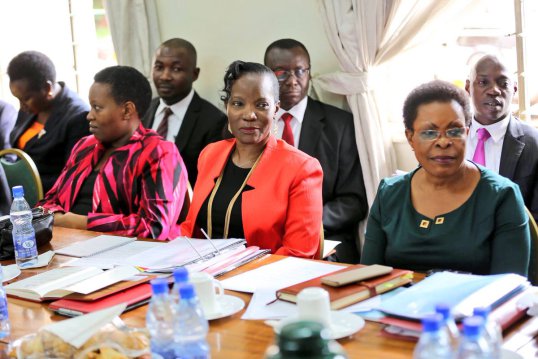Uganda Revenue Authority (URA) has revealed that ambulances are among the many items exempted from taxes.
This follows Speaker Rebecca Kadaga’s promise to lobby for tax exemption for ambulances saying they are not commercial or luxurious vehicles but a public good.
Kadaga made the appeal while launching ambulances donated by the Arua District Woman MP, Mourine Osoru on March 07, 2020.
This was after MP Osoru said she paid 50 per cent tax on each of the six ambulances affecting her plans for more vehicles.
In an exclusive interview with Business Focus,Ian Rumanyika, the Manager-Public & Corporate Affairs, says motor vehicle ambulances are exempted from import duty under the East African Community External Tariff. Ambulances are also exempted from VAT (Value Added Tax).
He however says that ambulances are not exempted from environmental levy.
For vehicles 8 years and above, they pay 50% of CIF (Cost Insurance Fright) value. According to Be Forward, an ambulance 8 years and above costs US$3,000 (Shs11.13m) upwards depending on the type and make.
“This means the MP brought in ambulances that are older than 8 years,” Rumanyika says.

Motor boat ambulance also has 0% import duty under East African Community Common External Tariff. It is also exempted from VAT.
According to URA, the incentive regime is structurally embedded in the country’s tax laws making them non-discriminatory and accessible to both domestic and foreign investment depending on the sector and level of investment.
“It is assumed that this tax incentive regime will spur investment within the economy and in so doing contribute to the achievement of Uganda’s vision 2040 whose aspirations are to transform Uganda from a predominantly low-income country to an upper middle income country within 30 years,” URA Commissioner General, Doris Akol says in the preamble of its guide on Tax incentives/exemptions.
According to URA’s guide on Tax incentives/ exemptions available to the Uganda Investors, goods engraved or printed or marked with the hospital logo imported for use in licensed hospitals, as recommended by the Director of Medical Services subject to such conditions and limitations as the Commissioner may impose can be exempted from taxes.
Apart from ambulances, there are other items exempted from taxes in the health sector.
For example, Shadow less lamps for use in operating theatres are exempted from all taxes under the 5th schedule of the East African Community Customs Management Act, 2004.
Blood freezers are also exempted from all taxes under the 5th schedule of the East African Community Customs Management Act, 2004.
Other items exempted from tax in the health sector include Bedside screens, Air conditioners, Water heating equipment, Trolleys and stretchers, Packaging material for medicines, Raw materials for the manufacture of medicaments, Examination gloves for laboratory and medical use and Hospital furniture imported by dealers for supply to licensed hospitals.
Others include Medical Autoclaves (A medical autoclave is a device that uses steam to sterilize equipment and other objects. This means that all bacteria, viruses, fungi, and spores are inactivated), X-Ray Machines for medical use, Chemical Analysers for blood analysis, Ophthalmic instruments and appliances (This device is used to examine the eye), Dental drill equipment, Ultrasound machinery (An ultrasound machine makes images so that organs
inside the body can be examined), Syringes, Cardio graphic machine, Wheel chairs, Medical Crutches and Artificial parts of the body (teeth, legs, joints) among others.







Exempting some medical facilities from taxes is good, but what effect does it have on the cost of patients and public when they are going to have the services in hospitals, will hospitals reduce the amount charged at billing of patients…I hope it favours both parties and not impacting on one. Thank you.
Well combining all the facilities of hospital will be unfair .. for that the government has to come up with seperate module of duty exemption on Import and excise duties on medicines and medical equipments. Providing Govt. medical insurance to people living below poverty line etc.
Coming back to the Duty exemption of the ambulances it’s necessary so that the patient can be ferried on time to the hospital. Costs won’t get very low as u demand as the spares and maintenance cost on the vehicle is high like normal vehicles.